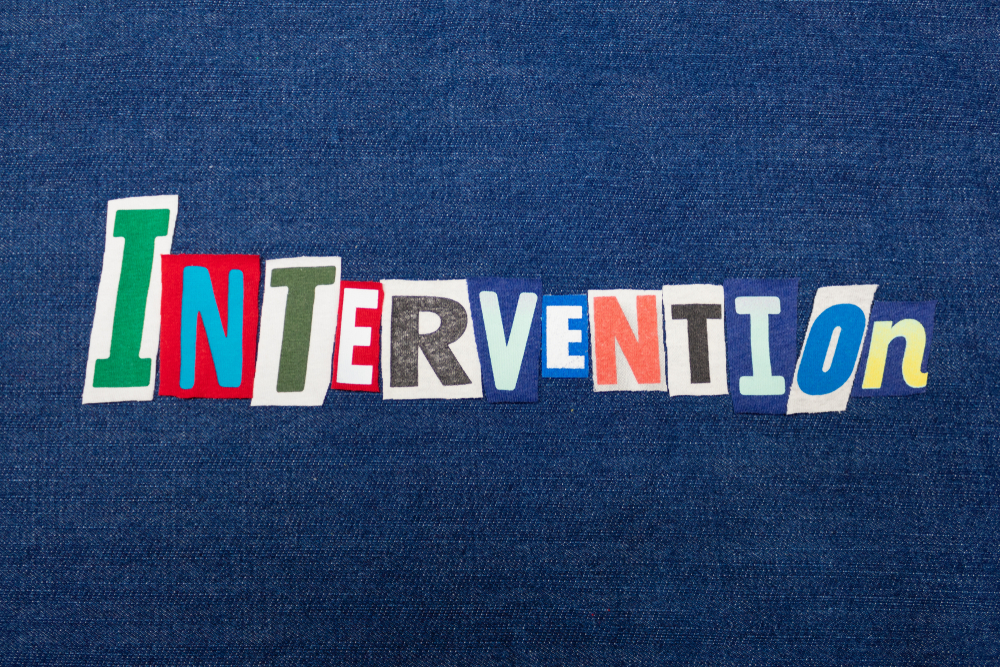
Written by:
Last Updated:
January 19th, 2026

What is an intervention?
An intervention is a carefully planned and compassionate conversation where loved ones express their concern about someone’s addiction. Rather than criticising or confronting in anger, the goal is to create a space where the person feels supported and can hear how their behaviour is affecting others.
The aim is to gently but clearly help them see the impact that their addiction has had on their own life and on those who care about them. An intervention can offer a moment of clarity for someone in denial or struggling to admit there’s a problem. It’s a chance to show them they’re not alone and that support is waiting whenever they’re ready to accept it.
Can an intervention be used for any addiction?
An intervention can be used for any kind of addiction, whether it involves substances like alcohol, prescription drugs or illegal drugs or behavioural addictions such as gambling, gaming or compulsive shopping.
The core purpose of an intervention is to help someone recognise how their behaviour is affecting themselves and those around them. It’s not limited by the type of addiction but rather by the impact that addiction is having. If a person’s actions are causing harm to their own health, straining relationships or leading to serious consequences in their day-to-day life, then an intervention can be a powerful and necessary step toward encouraging change.
When should an intervention be considered for someone?
It’s a difficult position to be in. You care deeply for someone, and you can see they’re struggling, but part of you wonders if they’ll grow out of it, if it’s just a phase or if you’re reading too much into their behaviour. That uncertainty can leave you feeling stuck.
Are they actually addicted? Or just in a rough patch?
One of the best things you can do is step back and assess what you’ve been seeing. Looking at their behaviour through a clearer lens can help you understand whether things have progressed to a point where an intervention might truly help.
Here are six questions you can ask yourself. If you answer “yes” to any of them, it may be time to consider an intervention seriously:
- Have they continued to use a substance or engage in a behaviour even though it’s clearly damaging their health, finances or wellbeing?
- Have they lied, manipulated or become secretive about their use or behaviour?
- Have they withdrawn from relationships, responsibilities or activities they once cared about?
- Do they react with anger or denial when you try to raise your concerns?
- Have there been any legal, financial or serious emotional consequences tied to their addiction?
- Do they seem unable to stop, even if they’ve said they would or tried before?
Answering yes to one or more of these can be a sign that your loved one is in deeper than they realise.
The Do’s and Don’ts of interventions
If you’ve come to the difficult realisation that your loved one may be struggling with addiction, and despite your efforts to show support, they continue to reject your concerns, it might be time to consider an intervention. While it can be an incredibly powerful turning point, an intervention isn’t something you want to rush into.
Done right, it can open the door to healing. Done poorly, it can push someone further away.
Below, we take a closer look at the do’s and don’ts of interventions to help guide your approach and give your loved one the best possible chance of accepting help.
|
Do ✅ |
Why | Don’t ❌ |
Why |
| Plan ahead and rehearse | Prepping in advance helps everyone stay calm, focused and on the same page when emotions run high. | Go in unprepared | Saying the wrong thing in the heat of the moment can cause hurt, confusion or rejection. |
| Include people they trust | A familiar, supportive presence can make them feel less attacked and more open to listening. | Involve people they don’t get along with | Tension between participants can shift the focus away from the addiction and onto personal conflict. |
| Use “I” statements | Saying how you feel keeps the tone gentle and avoids sounding accusatory. | Blame or shame them | Language that feels like an attack can cause defensiveness or shut the conversation down entirely. |
| Have a clear treatment option ready | Being prepared with a plan shows that you care and aren’t just trying to point out problems. | Expect them to find a solution on their own | They may be overwhelmed or scared. Without a clear next step, they’re more likely to resist help. |
| Be ready for any outcome | Even if they say no at first, you’ve planted a seed. Your calm, loving approach still matters. | Try to force them into a decision | Pushing too hard can cause them to dig their heels in or cut contact. |
| Get professional guidance if needed | An intervention specialist can help guide you, especially if you’re unsure how to handle sensitive dynamics. | Assume you have to do this alone | There’s support available for you too and leaning on it can make a major difference in how the intervention goes. |
What should I do if the intervention wasn’t successful?
It’s an incredibly tough position to be in. You’ve poured your heart into planning the intervention, only for it to fall flat or end in conflict. As disheartening as that is, it’s important to know this isn’t unusual. Sometimes interventions don’t go as planned. Your loved one might have become aggressive, stormed out or denied everything you said. It’s not a sign that you’ve failed; it’s often a sign that the addiction is still speaking louder than you can.
If this is what happened, try not to lose hope. Here are a few things you can do next:
- Give them some space: Emotions were high. Allow time for things to settle before reaching out again.
- Don’t undo your message: Even if you feel guilty, try not to backtrack or apologise for expressing your concern. What you said came from a place of love.
- Stay consistent: Keep offering support but with clear boundaries. Let them know your help is still there, but that the situation can’t continue unchecked.
- Consider professional guidance: Sometimes, bringing in an intervention specialist or addiction counsellor for the next step can make all the difference.
An unsuccessful intervention doesn’t mean they’ll never accept help. Many people who eventually enter recovery look back and recall that someone once tried to reach them. You’ve planted a seed and that matters more than you think.
The intervention was successful. What are the next steps?
If the intervention went well and your loved one has accepted help, this is the moment everything’s been leading to: getting the right support in place. It’s not easy for someone to say yes to treatment, so acting swiftly and with care is key. Many families turn to professional rehab services at this point, as they offer the structure, therapy and ongoing support needed to help your loved one begin their recovery journey.
Linwood House provides inpatient rehab for a wide range of addictions, including both substance-based (like rehab for alcohol, heroin or cocaine) and behavioural addictions (such as gambling or gaming). Our dedicated team is here to guide your loved one from detox through to aftercare, with round-the-clock support and evidence-based therapies tailored to their needs.
If you’re ready to take that next step, we’re here to help. Get in touch with Linwood House to find out how we can support you and your loved one.


